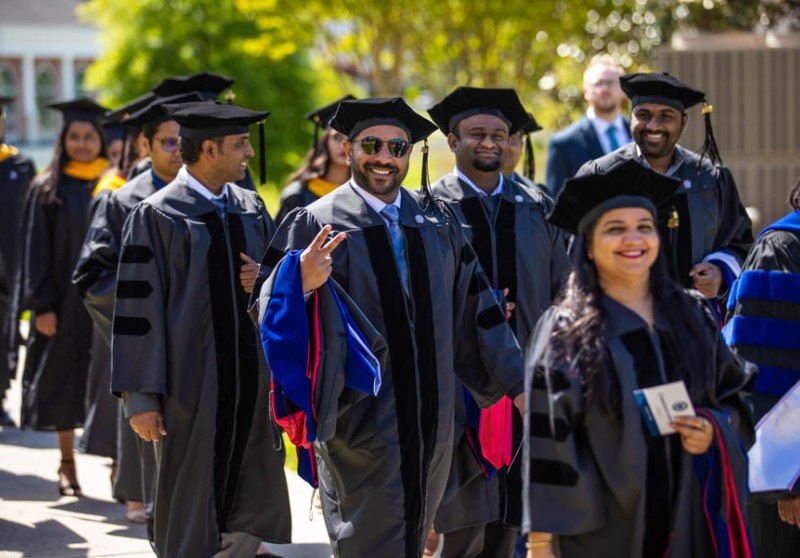Stand out from the competition by gaining an edge in your career.
Since businesses across the globe are heavily investing in AI, IT professionals must be prepared to evolve alongside the industry. As the use of artificial intelligence expands, businesses seek experts with advanced knowledge of AI and its business and technological applications.
Since artificial intelligence impacts nearly every facet of our lives and the professional world, you need the opportunity to build your the skills to effectively utilize AI technologies in response to workplace demands. Earning your Executive Master’s Degree in Artificial Intelligence could help you launch a new career or set yourself up for a promotion.
By the Numbers
Programs & Requirements
Executive Master's Degree in Artificial Intelligence
If you’re ready to achieve more in the field of artificial intelligence, Cumberlands is here to help you plan your next steps. With the recommended course rotation, a full-time student could complete the program in 12 months (three semesters). By taking part in our hybrid master's in AI program, you’ll develop theories, strategies, and tactics for critical fields, including business intelligence, IT management and leadership, data mining, and information security.
The Executive Master’s in Artificial Intelligence program covers core subjects such as AI in manufacturing, sales and marketing, healthcare, financial services, and risk management; data visualization, machine learning, AI and operations management, and transforming a business with AI, and a one-credit-hour learning project.
Classes are scheduled in two eight-week sessions and 16-week sessions during the fall, spring, and summer semesters. Full-time degree candidates typically take one or two classes per bi-term, a total of 6-9 hours per semester.
Course Requirements
- MSAI 511 - Introduction to Artificial Intelligence
- MSAI 531 - Neural Networks and Deep Learning
- MSAI 532 - Natural Language Processing
- MSAI 544 - Application of AI in Healthcare
- MSAI 578 - Data Visualization
- MSAI 630 - Generative AI with Large Language Models
- MSAI 631 - Artificial Intelligence for Human-Computer Interaction
- MSAI 632 - Application of AI in Risk Management
- MSAI 633 - Ethics in Artificial Intelligence
- MSAI 599 - Transforming Business with Artificial Intelligence
- MSAI 699 - Capstone Course (1 hour) or INTR 599 Applied Learning Practicum (1 hour)
*Executive format students can substitute the required INTR 599 course in lieu of LEAD 699 as part of their program degree requirements.
** Executive format programs have an applied learning component (internship or practicum) that is an integral and essential part of the established curriculum. Due to the applied learning component required for the degree program, Executive format students must enroll in INTR every term of enrollment.

Executive Student Resources
UC's Department of International Graduate Services enjoys providing support resources for our international students. Find tutorials and information regarding offices and policies for the International Graduate Students and programs.
Executive Program Format
Our Executive Programs include hybrid course days designed for international graduate students studying in the U.S., or domestic students seeking a hybrid-format program. We strive to incorporate professional experience and real-world application of course curriculum into our programs to enhance the learning experience. Practical Training is an integral part of program coursework and available to all students. At the University of the Cumberlands our degree programs focus on quality education at an affordable price.
Executive Program students take three (3) courses per semester. The program semester is based on the existing UC semester calendar, with three (3) annual semesters: fall, spring, and summer. Two of the courses each semester focus on the specific program content. Additionally, students will be required to attend an intensive residency weekend as part of their course enrollment each term. The third class includes an Applied Learning Practicum, in which students apply what they are learning in their other two courses to the real world via work or internship experiences.
Residency FAQs
Residency Session dates are determined by the course that you are registered for. It is very important that you make note of the class you registered for, as well as the designated residency weekend for that course as each course will only meet one weekend for the duration of the semester.
Even though we will only be meeting one weekend per semester, we will have the same number of contact hours with you. This will enable the instructors to make residency weekends much more valuable. This change will allow us to have meaningful projects on residency weekends.
You can view your semester schedule in your self-service portal in your Student Profile. Once you log into your MyUC account, click on Academics, then click on Current Schedule. Your schedule details will indicate the date and location of your residency weekend.
You can find information on the residency site locations on our website.
Yes, all three days are mandatory, and requests to arrive late or leave early will not be approved. Should you not be in attendance for the full session, you will be counted absent for the entire session. Please plan travel accordingly!
Attendance to each executive residency class session is mandatory. Students may make up no more than one (1) residency session throughout the duration of their academic program. Missing a second residency will result in the student being dismissed from the university.
A missed session will result in the student attending a make-up session, and paying a $300 residency make-up fee. In addition, the student may be asked for documentation from the program department providing an explanation as to why the scheduled residency session was missed. Make-up sessions must be completed prior to the end of the term. Noncompliance with this policy will result in dismissal from the executive program.
Make-up residency sessions will be held at our campus in Williamsburg, KY. You will be contacted with the time and dates after your absence is reported. There will only be one (1) residency make-up session offered each semester. Failure to attend all days of the makeup session will result in receiving a failing grade for the course, as well as potential dismissal from the University, and SEVIS termination.
If you cannot be in attendance for all three days then you will be counted absent for the entire residency weekend and be required to attend the make-up residency and pay the $300 make-up fee.
The Department of International Graduate Services will contact you via your UC student email as registration for the next term approaches. Please remember that you are required to register for (one) main class, (one) online class, and Applied Learning Practicum each semester in order to maintain your F1 status – late registration will not be accepted and can result in the termination of your student status.
Once you register for a class you will want to make note of the residency weekend that your class is scheduled, as that is the only session for that class that will be scheduled for the semester. You will need to be sure to plan your travel accordingly to ensure that you are in attendance for the full residency session.
Registration is done on a first-come, first-serve basis. Once a course is full, there will not be additional seats added, as we cannot exceed classroom seating capacity; therefore, it is advised that you register for classes as much in advance as possible. As a reminder, students cannot register for future semesters until their current tuition balance is paid in full.
*Please note all times are in local time zone*
Friday
Facility will open at 4:00 p.m.
Saturday
Facility will open at 7:00 a.m.
Sunday
Facility will open at 7:00 a.m.
We ask that you please take note of the above-mentioned times and schedule your travel accordingly.
*These dates have been set; however, if any changes are made, they will be made prior to registration for that semester. Not all dates are available at each residency location.
Fall 2024 (August 26th – December 13th)
- September 27 – 29
- October 4 – 6
- October 11 – 13
- October 18 – 20
- October 25 – 27
- November 1 – 3
- November 8 – 10
- November 15 – 17
- November 22 – 24
Spring 2025 (January 6th – April 30th)
- January 31-February 2
- February 7-9
- February 14-16
- February 21-23
- February 28-March 2
- March 7-9
- March 14-16
- March 21-23
- March 28-30
- April 4-6
- April 11-13
Take the Next Step
Mission & Goals
Students in the executive artificial intelligence program will develop skills needed to design, implement, and manage AI systems and solutions in a variety of professional settings.
Artificial Intelligence Careers & Outcomes
All stats from U.S. Bureau of Labor Statistics
Logistics Analyst: $77,030
Logistics Analyst: $77,030
Logisticians analyze and coordinate an organization’s supply chain.
Research Analyst: $82,360
Research Analyst: $82,360
Operations research analysts use mathematics and logic to help solve complex issues.
Transportation Analyst: $98,560
Transportation Analyst: $98,560
Plan, direct, or coordinate transportation, storage, or distribution activities in accordance with organizational policies and applicable government laws or regulations.
Computer and Information Research Scientist: $131,490
Computer and Information Research Scientist: $131,490
Computer and information research scientists design innovative uses for new and existing computing technology.
Data Scientist: $100,910
Data Scientist: $100,910
Data scientists use analytical tools and techniques to extract meaningful insights from data.
Database Administrator/Architect: $101,000
Database Administrator/Architect: $101,000
Database administrators and architects create or organize systems to store and secure data.
Common Questions
An executive master's in artificial intelligence (MSAI) is a graduate program designed for professionals seeking advanced knowledge in AI and its business applications. It prepares students to effectively utilize AI technologies in response to workplace demands and evolving industry trends.
The program typically requires the completion of 31 credit hours and can be completed in as little as 12 months for full-time students. The duration may vary depending on the student's pace and the program's specific structure.
Yes, the executive master's in artificial intelligence is offered in a hybrid format, combining online coursework with in-person sessions. This flexible approach allows students to balance their studies with professional and personal commitments.
Earning an executive master's in artificial intelligence can significantly enhance your career prospects, preparing you for roles that require advanced AI knowledge and skills. The program's focus on practical application and up-to-date best practices makes it a valuable investment for career growth.
Graduates can pursue various high-level roles such as logistics analyst, research analyst, transportation analyst, computer and information research scientist, data scientist, or database administrator/architect. The program equips you with the skills needed to excel in AI-related fields across multiple industries.
To enroll, you need to meet the standard graduate admission requirements, which typically include relevant work experience, an undergraduate degree, and completing the application process. The program is designed for professionals looking to advance their careers in artificial intelligence.

Executive Program Admission Requirements
All students in our executive programs are required to meet a standard set of admissions requirements for graduate students.
Faculty Experts
Learn more about the professors you will interact with.

Dr. Raed Sbeit
Request Information
Let us know of any questions that you may have!

